Occupation for fuck sakes. Why do you listen to the nutjobs?Occupation, or existence?
Yeah. This was about 4:15 PM yesterday looking north-ish from my office:
View attachment 31063
The first storm completely missed.
Occupation for fuck sakes. Why do you listen to the nutjobs?Occupation, or existence?
Yeah. This was about 4:15 PM yesterday looking north-ish from my office:
View attachment 31063
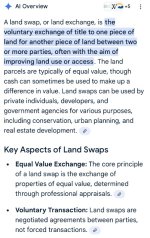
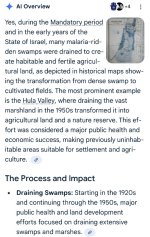

Not gonna happen. Israel isn't in the position to bargain. Grovel, yeah, bargain, no.Is “Palestine” going to be interested in voluntary land swaps with Israel?
Malaria in Mandatory Palestine - Wikipedia
en.wikipedia.org
Ok. I was asking if the short version of what you were posting translated to “land swaps” or not.Not gonna happen. Israel isn't in the position to bargain. Grovel, yeah, bargain, no.
If you keep ignoring why Israel was attacked on October 7 and why the world turned on Israel, youre never going to understand and miss every point.Ok. I was asking if the short version of what you were posting translated to “land swaps” or not.
Israel is definitely losing the propaganda war, but is it losing the military war (?) and that’s why they need to grovel, etc…after being attacked on Oct 7th then? Just trying to follow your logic.
So you’re saying that “Palestine” isn’t going to be interested in any land swaps then? Hamas is stating that they want EAST Jerusalem as their capital (I’m assuming exclusively) which is also the capital city of Israel, so how’s that going to work? Why is Hamas specifically stating EAST Jerusalem? That’s kinda interesting language unto itself.
Anyway, are Israel & Palestine going to negotiate between themselves over their future borders (?) or is someone/something else going to dictate that for them both at this point then?
Ramallah has been the capital of the “Palestinian Authority” since 1995. Ramalla is the administrative capital of the Palestinian Authority, set up by the Oslo Accords of 1993.
Your interpretation though your filters of why Israel was attacked (at least we both seem to agree that Israel was attacked) on October 7th. The difference seems to be that you justify it & I don’t.If you keep ignoring why Israel was attacked on October 7 and why the world turned on Israel, youre never going to understand and miss every point.
The propaganda has been thick from October 7th including on October 7th, so how can you say this isn’t/wasn’t about propaganda?Wow...just wow. So uninformed and naive.
From the beginning this has been a dog pile on Israel from the Arab League to Iran and all of its proxies for decades.It wasn't propaganda.
Same thing with the Palestinians as there’s at least two dancers in this goat rodeo. There’s not one innocent and one guilty party here…there’s a dozen different parties all with their own agendas here.All anyone needed to do to see the light was listen to the leadership of Israel. Their own history of violence, statements and actions brought the hate on themselves.
This doesn’t even make sense. Whether or not they “had to” is irrelevant in the context of what they actually “did do” and have continued to do, and filmed for their audience as well as to ensure Israel had to follow them back into Gaza.Hamas didn't have to do a damn thing, they just let Israel be Israel.
Hamas sure tried to ensure that there wouldn’t be rookie numbers here in an asymmetrical urban combat location of Hamas’s choosing. It’s good to have goals I guess.Military wise, in a stated admission from IDF says that 80% of the casualties in Gaza are civilian. Is that success?
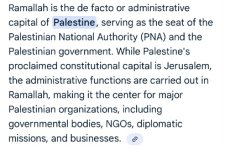
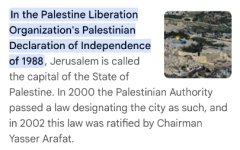
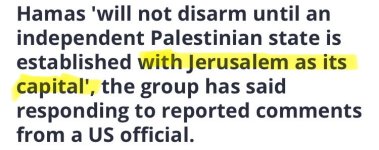
Is there any chance the EAST Jerusalem is a part of Jerusalem, and this statement is just to emphasize that Israel will have to move it’s centre of government for its nation before the dog & pony show even happens on September 22nd, ‘cuz don’t want peace breaking out before that vote could happen. That would be bad for PR.BTW...Ramallah is and has been the Capital for 35 years.
Is there any chance “from the river to the sea” isn’t about eliminating Israel’s existence? The opinion has taken root in Israel, and among many Jews and non-Jews internationally, that the slogan ‘From the river to the sea, Palestine will be free’ is antisemitic, calling for the destruction of the state of Israel and the ethnic cleansing or murder of all Jews living in it, but anything can be justified if someone performs enough mental gymnastics.Is there any chance there there is Jerusalem AND EAST Jerusalem?
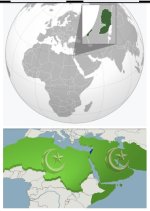
My filters? Facts are filters? You are misinformed and naive. You argued for days that patisseries were fully functional in Gaza after being baited. You wanted to believe it was true so deeply you spent 3 days trying to convince me and yourself it was true. That's the epitome of naive.Your interpretation though your filters of why Israel was attacked (at least we both seem to agree that Israel was attacked) on October 7th. The difference seems to be that you justify it & I don’t.
Just because somebody doesn’t agree with your interpretation, doesn’t mean they’re misinformed, or ill informed.
The propaganda has been thick from October 7th including on October 7th, so how can you say this isn’t/wasn’t about propaganda?
From the beginning this has been a dog pile on Israel from the Arab League to Iran and all of its proxies for decades.
Same thing with the Palestinians as there’s at least two dancers in this goat rodeo. There’s not one innocent and one guilty party here…there’s a dozen different parties all with their own agendas here.
This doesn’t even make sense. Whether or not they “had to” is irrelevant in the context of what they actually “did do” and have continued to do, and filmed for their audience as well as to ensure Israel had to follow them back into Gaza.
All that GoPro and cell phone footage from Hamas (& Friends) on Oct 7th in Israel, wasn’t an accident or an oversight, regardless of how you justify this is not being about propaganda.
Hamas sure tried to ensure that there wouldn’t be rookie numbers here in an asymmetrical her. It’s good to have goals I guess.
View attachment 31074
View attachment 31075
The terror group's (Hamas’s, for clarification) statement came after three major global powers indicated they were going to recognize a Palestinian state in the coming months.
View attachment 31076
Is there any chance the EAST Jerusalem is a part of Jerusalem, and this statement is just to emphasize that Israel will have to move it’s centre of government for its nation before the dog & pony show even happens on September 22nd, ‘cuz don’t want peace breaking out before that vote could happen. That would be bad for PR.
Is there any chance “from the river to the sea” isn’t about eliminating Israel’s existence? The opinion has taken root in Israel, and among many Jews and non-Jews internationally, that the slogan ‘From the river to the sea, Palestine will be free’ is antisemitic, calling for the destruction of the state of Israel and the ethnic cleansing or murder of all Jews living in it, but anything can be justified if someone performs enough mental gymnastics.
What is currently meant with, “From the river to the sea, Palestine will be free” depends on who is interpreting it and what their motivation is, as opposed to who is actually chanting it and what they actually mean.
I wonder if this will be a consideration in the establishment of “Palestine” with respect to future borders, and “land swaps” that you say won’t even be a consideration? The same with the malarial swamp land that was terraformed (by some group) into something actually useful as opposed to a large geographical health hazard?Jewish exodus from the Muslim world - Wikipedia
en.wikipedia.org
If the UN is going to try and impose it’s will, how many of these nations are UN members currently…
View attachment 31077
…are going to step up and put their money/land where their mouths are in the Palestine/Israel future borders/land swap thing that will have to happen? I’m assuming somewhere between zero and none?
Will Hamas actually step aside, disarm, disband, etc…or is all of this just more noise to drag this out and eventually eliminate the affront that Israels existence is?
You’ve stated facts, I’ve stated facts, others have stated facts. You’ve stated your opinion, I’ve stated my opinion, & others have stated their opinions on this.My filters? Facts are filters? You are misinformed and naive.
Yeah, then I just stopped bothering to mention it. Wouldn’t matter if the two of us were sitting at the same table at one of them, you’d have still claimed there’s no way it could exist, so I just dropped it.You argued for days that patisseries were fully functional in Gaza after being baited.
My instinctive reaction to executive demands like that is to say, “Blow me!” but that’s not conducive to debate & the exchange of ideas, and we’re 318 pages into this one (one of my favourite numbers by the way) so far, etc…so I’m not going to react in that manner, cause this is a virtual playground that I come to for stress relief, and to see others perspectives. I know, strange concept, etc…What propaganda is Hamas using that shifted the perspective of the entire globe and sent the globe towards hate of Israel? What did they do and how did they do it? Explain in full.
What the hell are you talking about now? Is this about me not wanting to download a bunch of weird shit onto my work phone still? I don’t download TikTok and all these other weird things onto my work phone. Just not gonna happen.Why are you afraid to see what the IDF GoPros are writing as history? Is it too goofy? Youre squeamish of blood and guts aren't you? You've only seen clip of one days video.
I think I remember that one or maybe a version of that one or one similar to that one from the last two years…& I’m assuming you’re not talking about Hezbollah bombing that soccer field with a bunch of Muslim kids playing on it in northern Israel, are you?Kids playing soccer in a street blown to bits is goofy?
 Anyway, I’m just being facetious here because I know you can only point the finger at the Jews. My bad.
Anyway, I’m just being facetious here because I know you can only point the finger at the Jews. My bad.What?What are you afraid of? there is no fucking way in hell you can say things that are very well documented and verified didn't happen if you had the fucking balls to see them because of your fear. You don't want to see the slaughter live streamed?
I’m glad I bring a little sunshine joy into your life.I love your green map.
You aren't naive even though its taken you 3 years to learn about Smotrich, Ben-Gvir and their Jewish Taliban ways or believing that a fully functional patisserie is operating in a levelled city with no power and water or that Hamas is winning a propaganda war but you won't or can't say how.You’ve stated facts, I’ve stated facts, others have stated facts. You’ve stated your opinion, I’ve stated my opinion, & others have stated their opinions on this.
I know this might sound crazy, but, not everyone everywhere is wrong or misinformed or disinformed if they say something contrary to your beliefs and spin on any specific topic including this one.
This isn’t a straight line who’s wearing the white hats and who’s wearing the black hats situation, at all, or at least that’s how I’m perceiving it.
Yeah, then I just stopped bothering to mention it. Wouldn’t matter if the two of us were sitting at the same table at one of them, you’d have still claimed there’s no way it could exist, so I just dropped it.
My instinctive reaction to executive demands like that is to say, “Blow me!” but that’s not conducive to debate & the exchange of ideas, and we’re 318 pages into this one (one of my favourite numbers by the way) so far, etc…so I’m not going to react in that manner, cause this is a virtual playground that I come to for stress relief, and to see others perspectives. I know, strange concept, etc…
So, are you “demanding” the propaganda right from October 7th-8th apparently pre-distributed before October 7th (?) or a full summary of the last two years (?) or the last couple months where they’ve been using these sick kids instead of just malnutritioned people? Stat! Explain in full, etc…?
What the hell are you talking about now? Is this about me not wanting to download a bunch of weird shit onto my work phone still? I don’t download TikTok and all these other weird things onto my work phone. Just not gonna happen.
I think I remember that one or maybe a version of that one or one similar to that one from the last two years…& I’m assuming you’re not talking about Hezbollah bombing that soccer field with a bunch of Muslim kids playing on it in northern Israel, are you?
View attachment 31080Anyway, I’m just being facetious here because I know you can only point the finger at the Jews. My bad.
There are at least two sides to every story and in this one there’s about a dozen different players and each have their own agenda and nobody’s a saint and nobody’s the good guy….or not, depending on whatever blinders you choose to wear, or not.
What?
I’m glad I bring a little sunshine joy into your life.
You are so far down a rabbit hole that you can’t even tell that you’re down it, so ok, whatever you say is gospel, to yourself, but it’s gospel. Other people can see the same things you do, but come up with a different opinion using their own mental filters (or framework, or pick your own term), and it doesn’t mean that they are wrong, it means that the situation is complex and nasty.You aren't naive even though its taken you 3 years to learn about Smotrich, Ben-Gvir and their Jewish Taliban ways or believing that a fully functional patisserie is operating in a levelled city with no power and water or that Hamas is winning a propaganda war but you won't or can't say how.
This isn’t a straight line who’s wearing the white hats and who’s wearing the black hats situation, at all, or at least that’s how I’m perceiving it.
I know this might sound crazy, but, not everyone everywhere is wrong or misinformed or disinformed if they say something contrary to your beliefs and spin on any specific topic including this one.
Same thing with the Palestinians as there’s at least two dancers in this goat rodeo. There’s not one innocent and one guilty party here…there’s a dozen different parties all with their own agendas here.
You can donate those to a woman’s shelter. As long as they can still charge up and dial 911, they’ll be accepted gratefully. Aside from that, fill your boots. If you think you need to post whatever it is you think you need to post here regarding this, maybe it’ll be good for you? I have no idea, & nobody’s gonna stop you, but I’m not sure who you think you’re convincing.I have a shoebox of old phones you can put goofy shit on to see shit for yourself. Want one? Or should I just put the blood and guts on here?
Rabbit hole eh? Can you describe a hole without describing all of its surroundings?You are so far down a rabbit hole that you can’t even tell that you’re down it, so ok, whatever you say is gospel, to yourself, but it’s gospel. Other people can see the same things you do, but come up with a different opinion using their own mental filters (or framework, or pick your own term), and it doesn’t mean that they are wrong, it means that the situation is complex and nasty.
Not everybody is down that same rabbit hole (or tangent, pick your own term here also) that you are, & it doesn’t mean that they’re ignorant or naïve or misinformed or disinformation or what have you…It just means they’re not on the same tangent that you are.
You can donate those to a woman’s shelter. As long as they can still charge up and dial 911, they’ll be accepted gratefully. Aside from that, fill your boots. If you think you need to post whatever it is you think you need to post here regarding this, maybe it’ll be good for you? I have no idea, & nobody’s gonna stop you, but I’m not sure who you think you’re convincing.
Yes, "rabbit hole." It's a reference to Alice's Adventures in Wonderland, where Alice went down the rabbit hole and ended up in the bizarre reality of Wonderland.Rabbit hole eh? Can you describe a hole without describing all of its surroundings?
Really? No fucking way!Yes, "rabbit hole." It's a reference to Alice's Adventures in Wonderland, where Alice went down the rabbit hole and ended up in the bizarre reality of Wonderland.
Have you ever seen a woman without a phone?Feel free to use your own terminology, & I’m assuming pretty much any woman’s shelter will gladly take your shoebox full of old phones.
I don’t know any women in shelters, but I know someone who worked at one for a few years, & that’s where all our old phones and chargers went.Have you ever seen a woman without a phone?
Yes. We were getting busy at the time.Have you ever seen a woman without a phone?
Life without a phone? Been there done that.Yes. We were getting busy at the time.
Hope you experience that someday.